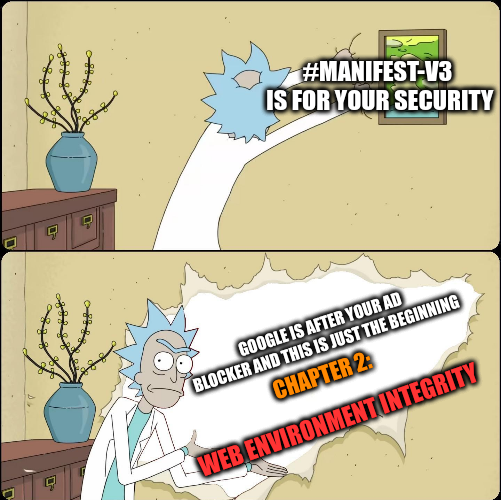this post was submitted on 22 Jul 2023
2603 points (99.2% liked)
Piracy: ꜱᴀɪʟ ᴛʜᴇ ʜɪɢʜ ꜱᴇᴀꜱ
54758 readers
239 users here now
⚓ Dedicated to the discussion of digital piracy, including ethical problems and legal advancements.
Rules • Full Version
1. Posts must be related to the discussion of digital piracy
2. Don't request invites, trade, sell, or self-promote
3. Don't request or link to specific pirated titles, including DMs
4. Don't submit low-quality posts, be entitled, or harass others
Loot, Pillage, & Plunder
📜 c/Piracy Wiki (Community Edition):
💰 Please help cover server costs.
 |
 |
|---|---|
| Ko-fi | Liberapay |
founded 1 year ago
MODERATORS
you are viewing a single comment's thread
view the rest of the comments
view the rest of the comments


Because HTTP and HTML are already stretched out to be broken resulting in the internet you know. Gemini protocol, on the other hand, starts from scratch with the idea to be limited by design on what it can possibly do, so as to remove the most common commercial enshittification cases as early as possible.
Sure you could make the argument that HTML has too much going on, but you don't have to use all of that. It is still at its core just as capable of rendering plaintext and hyperlinks as it was the day it was originally conceived.
Why couldn't this just be a webring of sites that are following a specific design philosophy. I don't understand the requirement of an entirely new language, protocol, and client. You're not executing the goal in any way than what is already possible, and you're cutting yourself off from being accessible by the vast majority of people by requiring them to install a whole new piece of software just to see if this idea is worth exploring.
The people who designed Gemini (and those who designed Gopher, and who did IRC, and...) have already gone to vast lengths explaining why it has to be redesigned from scratch, including new language and protocol. tl;dr: if you keep using current HTML, you have no way of preventing people from using eg.: or , or anything beyond such as ads and malware. No amount of "pinky fingy we promise" can allow you to assure to your clients that the sites you link to are safe, which kills the idea of a webring.
I'm all for the return of webrings, but if what you want to offer is something that is 1.- safe and 2.- as protected as possible from the evil incentives that drive corps, then at the current development stage it just can't be HTML.